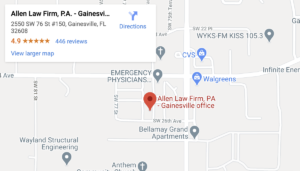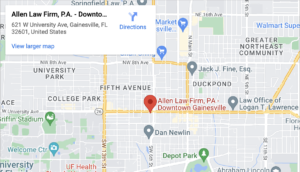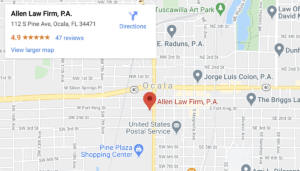
Impairment happens when something affects a person’s ability to function normally. Regardless of what causes it, impairment can be dangerous — especially behind the wheel.
In Ocala and throughout the State of Florida, car accidents that involve impaired drivers are a serious problem. Every year, lives are lost, and families are left devastated. Knowing the risks, laws, and consequences of driving impaired can help you make safer choices for yourself and pursue compensation if you were injured due to someone else’s negligence.
What Are the Dangers of Impaired Driving?

In order to drive safely, a person needs good judgment and coordination to be able to react quickly. Impairment slows down response times, can blur a driver’s vision, and messes with their ability to make rational decisions. It can cause accidents that injure or kill not just the driver but also their passengers, pedestrians, and other motorists.
Impaired drivers tend to take longer to recognize hazards and have trouble keeping control of their vehicles. Even just a few milliseconds’ difference in a person’s reaction time can be the difference between avoiding a crash and causing a deadly accident. Avoiding impairment while on the road is both a matter of personal responsibility and public safety.
What Are Some Common Causes of Impairment?
When people think about impairment, they often think of drunk drivers. However, that’s not the only thing that can cause it.
Alcohol
Even just a small amount of alcohol can affect a person’s coordination and judgment. In Florida, a driver with a blood alcohol concentration (BAC) of 0.08% or higher is legally impaired — but impairment can start well before reaching that limit. Many people don’t realize that even one drink can slow their reaction time and affect their thinking on the road.
Drugs
Both illegal and prescription drugs can cause impairment. Painkillers, sleep aids, and anxiety medications often slow reflexes and cause drowsiness. Even cold medicines can have dangerous side effects for drivers. It’s important to read medication labels carefully and talk to a doctor if you’re not sure how a drug might affect your ability to handle a vehicle.
Fatigue
A lack of sleep can be just as dangerous (and perhaps more so) than alcohol. Drowsy drivers have trouble staying alert, react slowly, and sometimes fall asleep behind the wheel. Studies show that going for a full day without sleep can impair a person’s driving the same way as having a BAC of 0.10%.
Health Conditions
Certain medical problems, like diabetes, seizures, and neurological disorders, can lead to sudden impairment. Drivers with these types of health conditions need to take extra precautions to make sure they’re safe to be on the road.
What Are Florida’s Laws on Impaired Driving?
The state has strict laws in place to fight against impaired driving, and law enforcement takes these violations seriously. First-time offenders convicted of driving under the influence (DUI) face fines, losing their license, and even jail time. The penalties increase with each offense.
Underage drivers face even stricter rules. Florida has a zero-tolerance policy for anyone under 21 with a BAC of 0.02% or higher. Additionally, the state’s “implied consent” law means that refusing a breathalyzer test can lead to an automatic suspension of their license.
Note that even though Florida has “no-fault” car insurance rules, a victim injured by an impaired driver may be able to file a lawsuit for full economic and non-economic damages–much more compensation than what personal injury protection (PIP) can provide.
What Are the Real-Life Consequences of Impairment?
Legal consequences deter dangerous behavior, but the personal and financial costs of an impaired driving conviction can last much longer than a prison sentence.
Accidents caused by impaired drivers can be severe and often leave victims with permanent disabilities, chronic pain, or the need for long-term or lifelong medical care. In the worst crashes, people often get killed through no fault of their own. Families of victims suffer emotionally and financially as they struggle with the aftermath of a preventable tragedy.
Beyond the immediate physical impact, impaired driving leaves lasting emotional scars. The guilt of causing a crash, even if it didn’t take anyone’s life, can stay with a person for the rest of their days.
Most drivers who caused such accidents wish they could take back what happened. Unfortunately, once a life is lost or someone is seriously hurt, there’s no undoing the damage. The only way to prevent these tragedies is to make smart and responsible decisions before getting behind the wheel.
Contact a Car Accident Lawyer in Ocala, Florida, for Legal Help
Every decision matters when it comes to safety on the roads. If there’s even a chance that you could be impaired by a drink or medications, don’t get behind the wheel. Arrange for a designated driver ahead of time or call for a taxi or rideshare. You can pick up your car when you’re safe to drive, but you can’t change the outcome if your impairment causes an accident.
For those who have suffered injuries from someone else’s impaired driving in Ocala, Allen Law Accident & Injury Lawyers can help. Contact our Ocala car accident lawyers today at (352) 351-3258 to go over your case and explore your legal options.





